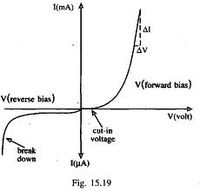Difference between revisions of "TF EIM Chapt5"
Jump to navigation
Jump to search
| Line 15: | Line 15: | ||
|- | |- | ||
| The n-p junction. The depletion region is represented as the shaded square | | The n-p junction. The depletion region is represented as the shaded square | ||
| + | |- | ||
| + | |[[File:TF_EIM_ReverseBiased_tophalfBipolar.jpg| 200 px]] | ||
| + | |- | ||
| + | | The n-p junction. The depletion region is represented as the shaded square. Notice it is larger than the forward biased n-p juntion | ||
|- | |- | ||
|} | |} | ||
Revision as of 02:05, 6 March 2011
Bipolar Transistor
The Bipolar transistor concept
From the last chapter we saw a p-n junction diode which had similar characteristic current-vs- voltage responses when biased either in the forward direction or backward.
Transistor Physical features
The three layers
A transistor has three semi-conductor payers. The three layers occur in the order of
p-n-p= holes-electron-hole
n-p-n= electron-hole-electron
The three layers are formed from a single crystal such that the doping of the single crystal defines the boundaries. The three layers are not "glued" together.


